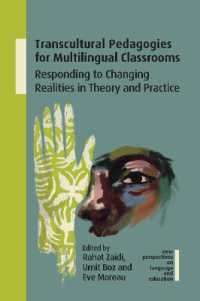Full Description
Introducing the idea of conversational storytelling interviewing (CSI) as an 'indirect' method of interviewing, David Boje and Grace Ann Rosile explore this innovative methodological framework as a way for respondents to tell their own story, without resorting to structured or semi-structured interviews.
Bringing together theory, method and praxis of storytelling in an iterative process of self-correcting induction, How to Use Conversational Storytelling Interviews for Your Dissertation offers researchers ways to move beyond the bystander role, urging them to be co-creators of their findings. Complete with exercises to train practitioners in new methods of inquiry and in-depth discussions of an array of philosophical issues, this illuminating book illustrates how rigorous self-correcting methods move inquiry from conversation to storytelling science.
Pioneering in both method and framework, this book is a crucial guide for using CSI in qualitative research for PhD students and researchers in management and organizational studies. Scholars of feminist and indigenous studies and other critical studies fields will benefit from alternative interviewing methods as these disciplines undergo an ontological turn.
Contents
Contents: 1. Introduction: Brief History, Topics Addressed, How to Use this Book, and Glossary of Terms 2. Dialogical and Dialectical conversational interviews: Using Self-Correcting AID phases and 4 Tests with the CIW case example 3. Choosing your research question: and using the storytelling paradigm theories including narrative retrospective, antenarrative prospective, counternarrative, living story, ensemble storytelling, and Grounded Theory 4. Storytelling Paradigm Method, including types of induction, narrative retrospective, antenarrative prospective, integrative qualitative-quantitative methods, narrative inquiry, and multiplicities 5. Storytelling Paradigm Praxes 6. Why Karl Popper is rolling over in his grave 7. Writing Dialectical/Dialogical and Big/little Storytelling Science Conclusions 8. Managing the oral examination and post-submission process Index






